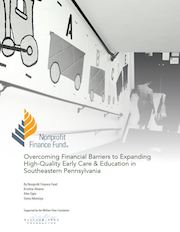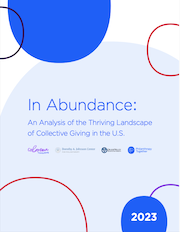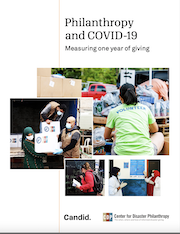Site Search
- resource provided by the Forum Network Knowledgebase.
Search Tip: Search with " " to find exact matches.
Seeking ways to maximize the social and economic returns of their place-based impact investments, foundations, CDFIs, private investors, and others are turning to collaboration. To support these efforts and facilitate lesson sharing, the Urban Institute and Mission Investors Exchange have produced a set of three practitioner briefs designed to focus on elements of place-based impact investing that have surfaced in research and conversations with practitioners as opportunities for knowledge exchange: building strong ecosystems, mapping opportunities and capacities, and deploying capital on the ground together through impact investing collaborations. Each brief presents the concept, highlights practitioner examples, and elevates lessons from the field.

Explore how philanthropy can empower organizations led by people of color, advocate for structural change, and confront the impacts of white dominant culture during COVID-19.
With the ongoing spread of coronavirus, protests demanding racial justice, and new data confirming the racial inequity of the pandemic – action is needed now. The social sector must acknowledge and actively work against the embedded racism in a range of systems, including healthcare, employment, education, housing, immigration, and criminal justice.
During our COVID-19 Funders Briefing Series I, Dr. Denise Rodgers from Rutgers University and Bob Atkins of New Jersey Health Initiatives discussed how philanthropy can respond to the systemic racism that underlies the disproportionate impact of COVID-19 on Black communities. This webinar will expand on those ideas to offer additional strategies and examples of how philanthropy can create a more equitable New Jersey during recovery and beyond.
We’ll hear from Ryan Haygood, President and CEO of the New Jersey Institute for Social Justice and Pat Eng, President and CEO of Asian Americans/Pacific Islanders in Philanthropy (AAPIP).
Topics will include:
- Actions taken to center equity during the pandemic.
- The disproportionate impact of COVID-19 on the physical, mental, and financial well-being of communities of color.
- How philanthropy can support organizations led by people of color in the fight for social justice.
Cost: Free for CNJG Members. $50 for Non Member Grantmakers
Webinar Video

In Abundance: An Analysis of the Thriving Landscape of Collective Giving in the U.S. explores the transformative impact of collective giving on philanthropy. Practiced in cultures all around the world, collective giving brings people together to pool their resources, including time, talent, treasure, testimony, and ties — often referred to as the 5Ts. Groups like giving circles, SVP chapters, giving projects, and nonprofit-led circles have long served as democratic and philanthropic learning hubs — bringing historically marginalized voices into philanthropic decision-making spaces, challenging preconceived notions of who is considered a philanthropist, and elevating members as integral actors in our sector’s efforts to advance diversity, equity, and inclusion in giving.
A partnership between the Johnson Center, Colmena-Consulting, and Philanthropy Together, this report underscores collective giving groups’ role in reshaping philanthropic practices, fostering social connections, and amplifying the voices of marginalized communities.

As of February 22, 2021, the coronavirus pandemic has claimed the lives of more than 2.5 million people around the world, with an additional 110 million people infected. And while data such as this serves an enormous purpose in understanding the scale and scope of a disaster, aiding experts in determining needs and directing resources, it remains far from the complete picture of the impact of COVID-19 on humanity.
Philanthropy’s response to the COVID-19 pandemic demonstrates that not only can donors be exceedingly generous in a crisis, but they can lead through trust and courage. In this new report, the Center for Disaster Philanthropy and Candid recognize this leadership, as demonstrated by increased overall giving, even if too little of it is in the form of unrestricted grants and funds directed toward Black, Indigenous, and other communities of color. There remains much to be done, especially regarding support for programs that deliver the policy and system changes necessary to redress generations of inequities.

In a series of four podcasts, GrantCraft explores the values, motivations, and stories of the up-and-coming generation of philanthropists. This series complements research conducted by 21/64 and the Johnson Center for Philanthropy at Grand Valley State University and related GrantCraft analysis.
On this webinar, we heard from McKinsey on the disproportionate impact of cOVID-19 on communities of color, as well as longer-term implications and solutions. Representatives from McKinsey discussed their report entitled “COVID-19: Investing in Black Lives and Livelihoods,” which is attached at the bottom of this webpage.
Speakers:
JP Julien, Associate Partner, McKinsey & Company, Philadelphia
Aria Florant, Engagement Manager, McKinsey & Company, Washington DC
Duwain Pinder, Associate Partner, McKinsey & Company, NYC
Cost: Free for CNJG Members/ $35 for Non Member Grantmakers
Webinar Video
The New Jersey Council for the Humanities (NJCH) recently awarded $199,637 in Incubation and Action Grant funding to sixteen organizations. Incubation Grants help organizations plan, research, develop, and prototype public humanities projects and events. Action Grants help organizations implement a wide array of humanities-based projects, including public programs, exhibitions, installations, tours, and discussion groups.<BR><BR>
Public humanities programming allows individuals to engage in lifelong learning and share in the exploration of history, values, cultures, and beliefs. NJCH supports and acts as a resource for cultural and service-oriented nonprofit partners as they bring the public humanities to the residents of New Jersey, harnessing the power of the humanities to strengthen communities.
The Trustees of The Fund for New Jersey awarded $920,000 in grants to 11 nonprofit organizations at their second quarterly Board meeting of 2022. Grants were awarded to organizations in the areas of democracy, racial justice, climate change, and the environment.
Kiki Jamieson, President of The Fund for New Jersey, stated, “We are pleased to continue investing in organizations advocating for fairer representation of communities of color, organizations like the American Civil Liberties Union NJ, New Jersey Institute for Social Justice, New Jersey Citizen Action Education Fund, and the League of Women Voters of NJ continue to be strong advocates of inclusive policies that enhance our democracy, increase civic engagement and promote social and economic justice.”
The Disability & Philanthropy Forum invites you to register for the 2024 Disability & Philanthropy Webinar Series. All of our 2024 webinars will be open to the public. This collective learning journey will focus on why a disability lens is essential to addressing key social justice issues. Each webinar will engage philanthropic leaders in conversation with disability advocates about how we can move toward a more equitable, inclusive future for all.
Disability in Indigenous Communities: November 14 - 1:00 - 2:00 p.m. ET
All webinars are open to the public, so feel free to share with anyone you know that's interested in learning about disability inclusion, rights, and justice.
CART will be provided. If you require another accommodation to fully participate in the webinar, please note it in your registration, or contact us at [email protected].
The Grantmakers Concerned for Immigrants and Refugees (GCIR) present this program coinciding with Women’s History Month. Bringing in leaders who work at the intersections of these identities, this webinar will provide an overview of the most pressing challenges faced by low-paid immigrant women as well as the diverse strategies groups are employing to address them. GCIR will focus on economic empowerment, we will explore how on the ways philanthropy can support the immediate needs of these communities while building long-term worker power that transcends migrant status and gender identity.
Registration:
There is no cost for this webinar.
You will need to log in or create an account on GCIR's website to register for this program.
Please register for this program by 5pm PT on Wednesday, March 26th.
Recent federal government actions such as funding interruptions and cancellations, proposed budget cuts, threats to programs and tax-exempt status, and a volatile economy are creating existential challenges to nonprofit organizations and the people and communities they serve.
How can philanthropy best support and work in solidarity with nonprofits, now and in the future?
Join us for an important discussion of the current landscape and a walk through the Doing Good Better framework of practical actions philanthropy can take now for greater impact and meaningful change.
Cost: Free for CNJG Members and Non Member Grantmakers
Presenters: New Jersey Center for Nonprofits and Council of New Jersey Grantmakers
As New Jersey enters its 9th week of sheltering in place and the close of businesses deemed non-essential, we have already seen the impact of policy decisions and the immense and growing need in our communities. The sheer number of people stricken with COVID-19, heartbreak of families and loved ones as they respond, widespread unemployment, difficulty accessing services, a lack of resources for immigrant and undocumented populations, financial uncertainty of nonprofits and small businesses, and a steep decline in physical and mental health, are some of the devastating challenges facing our country and state at this time.
Named to Gov. Murphy’s Restart and Recovery Advisory Council, Brandon McKoy, President of New Jersey Policy Perspective (NJPP) will present an overview of federal and state policy implemented in response to the COVID-19 crisis, with a special focus on how these policies impact nonprofits, vulnerable communities, and the state budget. A new NJPP report cautions, “Without proper funding, state government cannot fully serve the needs of the public, especially during a time of crisis when the demand for services is at an all-time high.” Brandon will share challenges in implementing these policies, policy recommendations to strengthen New Jersey’s response and recovery to the pandemic, and proposed systems change beyond resilience.
Cost: Free for CNJG Members and Nonmember Grantmakers
This program is only open to staff and trustees from grantmaking organizations.
Webinar Video
CNJG is pleased to offer this series of webinars to our members, hosted by our partners at the Center for Disaster Philanthropy.
With COVID-19 there seem to be more questions than answers, particularly for funders who want to respond effectively and efficiently. This series of seven webinars will bring expert panelists together to address some of the most pressing issues, including getting money out the door quickly, supporting vulnerable populations and managing other disasters in the midst of the pandemic.
Join the Center for Disaster Philanthropy for one or multiple webinars to gain a better perspective on the role of philanthropy in COVID-19 response and recovery.
Cost: Free for CNJG members and Nonmember Grantmakers
CNJG thanks the Center for Disaster Philanthropy for hosting this series.
Past Webinars in this Series:
April 14: Making Effective Rapid Response Grants
April 28: Managing Multiple Disasters Amid the Pandemic
May 12: Place-based Grantmakers and Investing in Local Communities
May 26: How Philanthropy Can Stand Up for Vulnerable Populations
June 9: Grantmaking to Support Children and Older Adults
June 23: Managing a Global Response
